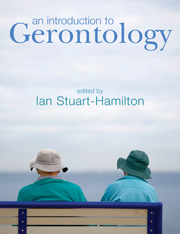Book contents
- Frontmatter
- Contents
- List of figures
- List of tables
- List of contributors
- 1 Introduction
- 2 The biology of ageing
- 3 Fostering resilience, promoting health and preventing disease in older adults
- 4 Ageing and health
- 5 Social care and older people
- 6 Cognitive processes and ageing
- 7 The psychology of atypical ageing
- 8 Sociological perspectives on ageing
- 9 Retirement
- 10 Sexuality and ageing
- 11 Policies on ageing
- 12 Cross-cultural differences in ageing
- 13 Technology and ageing
- 14 Literary portrayals of ageing
- 15 Palliative care for older adults
- 16 Conclusions
- Index
- References
16 - Conclusions
Published online by Cambridge University Press: 05 June 2012
- Frontmatter
- Contents
- List of figures
- List of tables
- List of contributors
- 1 Introduction
- 2 The biology of ageing
- 3 Fostering resilience, promoting health and preventing disease in older adults
- 4 Ageing and health
- 5 Social care and older people
- 6 Cognitive processes and ageing
- 7 The psychology of atypical ageing
- 8 Sociological perspectives on ageing
- 9 Retirement
- 10 Sexuality and ageing
- 11 Policies on ageing
- 12 Cross-cultural differences in ageing
- 13 Technology and ageing
- 14 Literary portrayals of ageing
- 15 Palliative care for older adults
- 16 Conclusions
- Index
- References
Summary
OVERVIEW
This chapter first notes that changes in individuals might vary from those of groups. It then addresses how changes in one area of gerontology can have a significant effect on others, leading to a need constantly to maintain a broad knowledge of the subject.
The purpose of a concluding chapter in an edited volume is typically to draw together the themes raised and create a grand overview, preferably one filled with sage wisdom. I have no pretentions of being able to do such a thing, not least because trying to find a unifying theme, beyond a bland platitude, such as ‘more must be done’, in a subject as diverse as gerontology would be a fool's errand. In support of this I cite the words of the historian H.A.L. Fisher, who wrote the following, largely as a riposte to the then-fashionable view of history as an inevitable process towards a particular ideological system of government:
Men wiser and more learned than I have discerned in history a plot, a rhythm, a predetermined pattern. These harmonies are concealed from me. I can see only one emergency following upon another as wave follows upon wave, only one great fact with respect to which, since it is unique, there can be no generalizations, only one safe rule for the historian: that he should recognize in the development of human destinies the play of the contingent and the unforeseen.
(Fisher, 1935, p. vii)- Type
- Chapter
- Information
- An Introduction to Gerontology , pp. 430 - 437Publisher: Cambridge University PressPrint publication year: 2011



